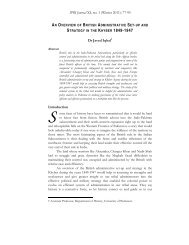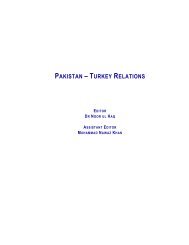120 Whither Kashmir? (Part II) - Islamabad Policy Research Institute
120 Whither Kashmir? (Part II) - Islamabad Policy Research Institute
120 Whither Kashmir? (Part II) - Islamabad Policy Research Institute
Create successful ePaper yourself
Turn your PDF publications into a flip-book with our unique Google optimized e-Paper software.
32 IPRI Factfile<br />
WHY RUSH TO DIALOGUE?<br />
It is strange to see the Pakistan government agreeing to foreign secretary<br />
level talks with India as early as 25 February when no less a person than<br />
the Prime Minister has revealed that India does not want <strong>Kashmir</strong> on the<br />
dialogue table. Now that the most pressing issues all arise out of the<br />
<strong>Kashmir</strong> dispute, it seems absurd to commence a dialogue casting aside<br />
the agreed composite dialogue formula as well as agenda and to embark<br />
on a new venture where India has already declared what it wants to<br />
discuss. Why is Pakistan in such a hurry to get to the dialogue table with<br />
India when there is little substance in terms of conflict resolution that<br />
India is in a mood to concede to? What are the pressures on Pakistan?<br />
Surely it would have been better to get a national consensus through<br />
parliament before embarking on such a dicey dialogue track? But once<br />
again, the Foreign Minister, whose unseemly haste in welcoming the<br />
Kerry Lugar Act is still vivid in most Pakistani memories, seems almost<br />
desperate to accept India’s terms for a dialogue.<br />
Equally ridiculous is the Foreign Office’s declaration that Pakistan<br />
will hold talks “with an open mind”, given how India has already closed<br />
it mind to any suggestions for an agenda on the part of Pakistan. So,<br />
under these circumstances, and “open mind” would merely denote an<br />
acceptance of Indian diktat, beginning with the agenda. As for the<br />
argument that the dialogue is necessary because of the critical water issue,<br />
this is an effort to fool the people. First, the water issue cannot be<br />
resolved without resolution of <strong>Kashmir</strong> since the seeds of the dispute lie<br />
within this larger political conflict. India would like to discuss water<br />
outside of <strong>Kashmir</strong> so as to create an artificial disconnect between the two<br />
inextricably linked issues. Second, and linked to the first point, is the fact<br />
that if India wants to discuss water outside of the <strong>Kashmir</strong> dispute, there<br />
is already a mechanism inbuilt into the Indus Water Treaty so there is<br />
actually no need for the commencement of dialogue between the two<br />
sides to push for resolution of the waters dispute. After all, the Treaty has<br />
international guarantors who should now be called upon to play their<br />
role since they forced the rulers of the time to sign away Pakistan’s rights<br />
to three crucial rivers. Finally, the water issue has effectively moved into<br />
the area of state terrorism on the part of India so perhaps it can also be<br />
discussed under that head as part of the composite dialogue. Otherwise<br />
once again India will present Pakistan with a fait accompli in terms of<br />
illegal dams.




